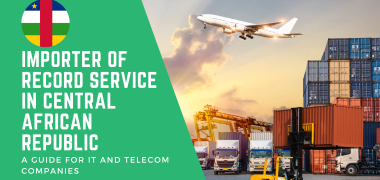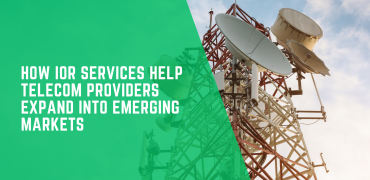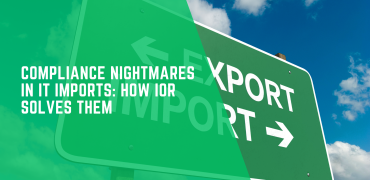The Central African Republic (CAR) is a country with immense potential for growth in the IT and telecom sectors. However, navigating the complex regulatory environment and logistical challenges can be daunting. This guide aims to provide IT and telecom companies with a comprehensive understanding of the Importer of Record (IOR) service in CAR, including import duties, taxes, special permits, and approvals required for importing IT and telecom equipment.
Understanding the Importer of Record (IOR) Service
An Importer of Record (IOR) service is essential for companies that do not have a legal entity in the country where they wish to import goods. The IOR acts as the official importer, ensuring compliance with local laws and regulations. This service is particularly valuable in the Central African Republic, where regulatory frameworks can be intricate and change frequently.
Import Duties and Taxes on IT and Telecom Equipment
Importing IT and telecom equipment into the Central African Republic involves several duties and taxes. Understanding these costs is crucial for budgeting and planning.
1. Customs Duties
Customs duties in CAR are calculated based on the Cost, Insurance, and Freight (CIF) value of the goods. The rates can vary depending on the type of equipment:
- IT Equipment: Typically, customs duties for IT equipment such as computers, servers, and networking devices range from 5% to 20%.
- Telecom Equipment: Telecom equipment, including switches, routers, and communication devices, may attract duties ranging from 10% to 25%.
2. Value Added Tax (VAT)
The standard VAT rate in the Central African Republic is 19%. This tax applies to the importation of all goods, including IT and telecom equipment. VAT is calculated on the CIF value plus customs duties.
3. Excise Duties
Certain telecom equipment may be subject to excise duties, particularly if they are considered luxury items or have specific environmental impacts. These duties can range from 5% to 15%.
4. Additional Fees
- Handling Fees: Fees associated with the handling and processing of goods at ports or airports.
- Inspection Fees: Costs incurred for the inspection of goods by customs authorities.
- Documentation Fees: Charges for the preparation and submission of necessary import documentation.
Special Permits and Approvals
Importing IT and telecom equipment into CAR requires various permits and approvals to ensure compliance with local regulations. Companies must be aware of these requirements to avoid delays and penalties.
1. Import License
An import license is mandatory for bringing IT and telecom equipment into the country. This license is issued by the Ministry of Commerce and Industry and must be obtained before the shipment arrives.
2. Telecommunications Regulatory Authority (ART) Approval
The Telecommunications Regulatory Authority (ART) oversees the telecom sector in CAR. Importers must obtain approval from ART for any telecom equipment to ensure it meets local standards and regulations. This process involves:
- Technical Compliance: Ensuring the equipment adheres to local technical standards.
- Frequency Allocation: If the equipment uses specific frequencies, approval from ART is required to ensure there is no interference with existing services.
3. Environmental Clearance
For certain electronic equipment, environmental clearance may be required from the Ministry of Environment. This ensures that the imported goods comply with environmental protection standards and do not pose a hazard.
4. Safety and Quality Certification
Safety and quality certification from recognized bodies may be necessary to prove that the equipment is safe for use and meets international quality standards. This can involve certifications such as CE (Conformité Européene) or ISO (International Organization for Standardization) standards.
The Role of the IOR in CAR
Engaging an Importer of Record (IOR) service simplifies the process of importing IT and telecom equipment into CAR. Here’s how an IOR can assist:
1. Compliance Management
The IOR ensures that all import regulations and standards are met, reducing the risk of non-compliance and associated penalties.
2. Documentation and Licensing
Handling all necessary documentation and licensing requirements, the IOR streamlines the import process, ensuring all permits and approvals are obtained efficiently.
3. Customs Clearance
The IOR facilitates smooth customs clearance by managing duties, taxes, and other fees, as well as liaising with customs officials.
4. Logistics Coordination
The IOR coordinates the logistics of shipping, from arranging transportation to managing warehousing and distribution once the goods arrive in CAR.
5. Risk Mitigation
By ensuring compliance and handling logistics, the IOR reduces the risks associated with importation, such as delays, fines, and seizure of goods.
Practical Steps for IT and Telecom Companies
To successfully import IT and telecom equipment into CAR, companies should follow these practical steps:
1. Engage an Experienced IOR
Select an IOR with experience in the CAR market and a deep understanding of local regulations and logistics. This will ensure a smooth and compliant import process.
2. Prepare Documentation
Ensure all necessary documentation is prepared in advance, including commercial invoices, packing lists, certificates of origin, and any required permits or licenses.
3. Understand Local Regulations
Stay informed about local import regulations and changes in the regulatory environment. This can be achieved through regular consultation with the IOR and monitoring updates from relevant authorities.
4. Budget for Duties and Taxes
Accurately calculate the total cost of importing goods, including all duties, taxes, and additional fees. This will help in budgeting and financial planning.
5. Plan for Logistics
Coordinate with the IOR to plan the logistics of shipping, including transportation, warehousing, and distribution. Ensure there are contingency plans for potential delays or disruptions.
Conclusion
Importing IT and telecom equipment into the Central African Republic presents unique challenges but also significant opportunities for growth and development in the region. By engaging an Importer of Record (IOR) service, IT and telecom companies can navigate the complex regulatory landscape, ensure compliance, and manage logistics efficiently. Understanding the import duties, taxes, and necessary permits and approvals is crucial for a successful import process.
This guide provides a comprehensive overview of the requirements and steps involved in importing IT and telecom equipment into CAR. By following these guidelines and leveraging the expertise of an IOR, companies can tap into the growing market in the Central African Republic and contribute to the advancement of the country’s IT and telecom infrastructure.




